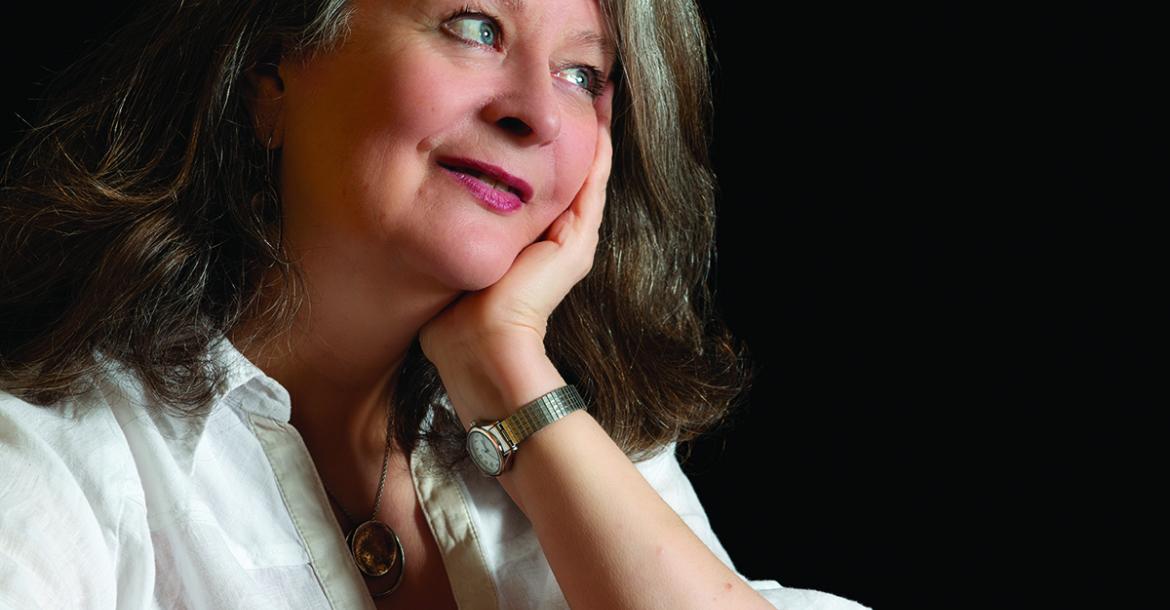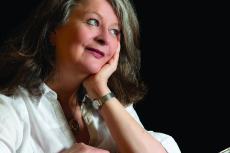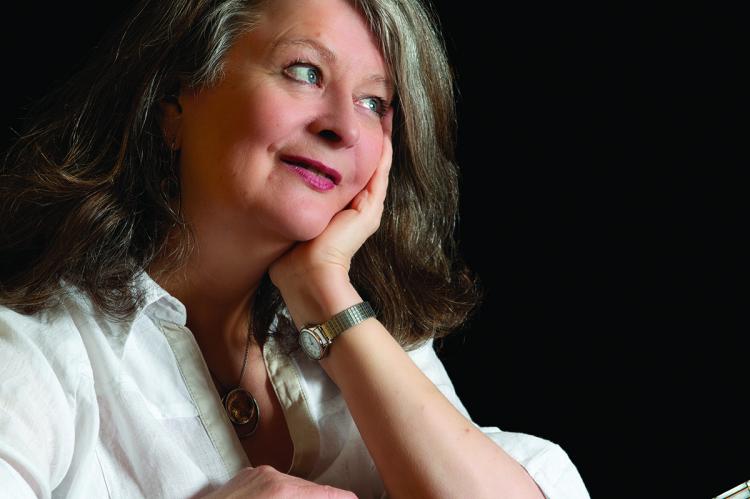Christine Kydd - on teaching, singing and ...
Christine Kydd has been a stalwart of the Scottish folk scene for over 30 years and is renowned not only for her singing and performing, but also for her involvement in numerous teaching, theatrical and community projects and as a vocal coach and choir director.
Christine Kydd has been a stalwart of the Scottish folk scene for over 30 years and is renowned not only for her singing and performing, but also for her involvement in numerous teaching, theatrical and community projects and as a vocal coach and choir director.
Having been nominated for the Scots Trad Music Award for Scots Traditional Singer of the Year in 2012 and 2018, she was inducted into the Scottish Traditional Music Hall of Fame for services to performance in 2018.
She has recently released her first solo album for 20 years to extensive acclaim, so this is an appropriate time to chat about her long and still very much ongoing career. Following unavoidable delays in arranging a meeting, Christine was brave enough to travel from her home in Angus to Edinburgh on a very windy January afternoon and we met in a coffee bar at Waverley station before she went on to meet friends at Sandy Bell's. We spent a good hour discussing her past, present and future.
Christine told me she had first played with a group of friends at the age of 10 in Glasgow, before she and her guitar arrived in Edinburgh in the 1980s. She worked with John Barrow for a time and it was at Edinburgh Folk Club that she first discovered and explored the joys of unaccompanied singing. When asked more about the music she was listening to then, and if there was anyone in particular who inspired or motivated her to sing, she said: “My friends and I were listening to all sorts of music in the charts, including Mary Hopkin, Carole King, James Taylor, Lindisfarne, Matt McGinn, Billy Connolly, Lou Reed and Bruce Springsteen. We had Singing Together at school and we got together to sing songs we were learning and hearing from other friends at school. At University in St Andrews I heard a lot of acts live, it was amazing - John Martyn, The Police, The Jam! Then at Edinburgh Folk Club we had Rab Noakes, Iain Mackintosh, Jock Tamson’s Bairns. I was really struck by how unaccompanied singing was a whole form of its own, and I was amazed that people could sing without the ‘protection’ of a guitar! John Barrow and Iain and June Green took me to Balerno Folk Club where I heard Cilla Fisher and Artie Trezise. I was bowled over by them and by Cilla Fisher’s singing. John, as my boss, introduced me to so many singers and musicians, and as his assistant I learned on the hoof about the folk scene.”
Christine’s involvement in that folk scene became quite extensive. She formed a long-standing musical partnership with Janet Russell at St. Andrews University, where she also played in a band with Iain Bayne, who would later become Runrig's drummer. In Edinburgh, Christine played with various bands such as Just The Very Donkeys, featuring Andy Thorburn, and Miro, which included future members of Shooglenifty (James Mackintosh and Iain Macleod) in its ranks, as well as Simon Bradley. She also worked with members of Jock Tamson's Bairns and The Easy Club, with Patsy Seddon and Mary Macmaster, and she played on albums by the likes of Davy Steele. In addition, she took part in Theatre Communicado's play of Jock Tamson's Bairns, which featured the Cauld Blast Orchestra.
It was, however, her partnership with Janet Russell that made her name. They toured extensively at home and abroad, and released two albums, the self-titled first album in 1987 and Dancin' Chantin' in 1994, these displaying their innovative harmonies. Their success was also significant in bringing a female perspective to what was still a male dominated world. Christine tells us more about that time. “With Janet, I was exploring the art of two-part harmony, to see what could be pushed, and how to make a sound with the two voices that underpinned the emotional content of the songs. I was not as confident as a soloist, but I loved harmonising. We are all interested in singers from different cultures, and the Bulgarian harmony voices we were hearing at the time had a huge influence on how I chose to approach our songs. Janet is a very strong, committed singer, so I could try lots of weird ideas and she’d hold the line brilliantly. She and I worked for about 10 years together in total, touring around the UK, and we made two tours in North America, one of these including the North American Folk Alliance in Seattle, and Dirty Linen magazine featured us. We went down a storm in the main showcase. I think what appealed was we were new, we were women, our music was good, and we sang songs of social justice - we had fun, banter and it was our life!” Janet eventually left for England, but she and Christine still keep very much in touch after all these years.
Christine herself later went south to study voice and vocal coaching in London, and she taught voice at Guildford School of Acting, returning to Scotland to share the skills she had acquired - using theatre techniques in the interpretation of traditional song while retaining the voice's natural qualities. “The course at the Central School of Speech and Drama in London,” she says, “was amazing – we were studying with directors and actors, and our tutors were top people, including Hollywood vocal coaches. Having studied, I was interested in making a bridge between the learned techniques and hearing how traditional singers used a lot of technique without thinking about it. Not because I think everyone can be taught - some are just naturals - but I was interested in how people can approach a song, connecting with the language and the story. Traditional singers use pauses in great ways to break up elements of a song, and so much of the style is about the feel of the words, not just rote learning and singing to the end of each line. I wasn’t interested in deconstructing anyone else’s voice, but in supporting them with ideas like using a particular whispering technique to connect, like we had done with really tricky Shakespeare texts in college, and breathing and movement exercises like the hoeing that Frankie Armstrong uses in her work, and deep breathing to help nerves.”
As well as studying and teaching, Christine continued to perform solo and found the time to record two albums, Heading Home in 1993 and Dark Pearls in 1999, but her performing and recording seems to have been more focussed around collaborations with other musicians such as Calluna with Charlotte Peterson, Rebecca Knorr and Anna-Wendy Stevenson. Chantan, another collaboration featuring a young Corrina Hewat and Elspeth Cowie, released one album, Primary Colours, once again specialising in vocal harmonies, this time accompanied by guitar, harp and percussion. A further longstanding vocal harmony duo with Barbara Dymock known as Sinsheen followed, leading to the album Lift, produced by Michael Marra in 2009. Christine has long been an admirer of the man from Dundee - Lift features his Mother Glasgow and his pen is revisited on Christine's latest solo album. The variety of the harmonies on the Sinsheen album can be gauged, for example, by the unaccompanied vocals on Harriet Tubman and Fareweel Tae Tarwathie, the latter best known from Judy Collins. It certainly holds up to a lot of listening 10 years on. Due to family bereavements Christine and Barbara have not been able to perform together in recent years, although they have acted as replacements for each other at scheduled gigs and still manage to keep in touch.
“The collaborations came about in a number of ways,” Christine says, “old flatmates from Edinburgh, meeting at sessions, Elspeth and I appeared in Miro together at some point, she introduced me to Corrina, Calluna asked me to try some material out, Barbara contacted me to see if I’d be up for a project. I’ve always enjoyed collaborations and harmony singing, and so my latest project with a band is quite a buzz - I never took to the role of lead singer as a younger woman, but I’m quite enjoying it now and I’ve done a lot of solo gigs in the last few years. When you’re heading a line-up and carrying all or most of the chat, I think the stagecraft is a key feature of any gig and it’s great to keep developing that.”
Although Christine had only recorded two solo albums prior to her recent release, Shift & Change, one can find her featured on numerous Greentrax compilations and other recordings, notably on several volumes of Fred Freeman's Songs Of Robert Burns series. Shift & Change takes its name from one of Christine's own compositions on this fully honed collection of traditional, contemporary and her own songs. Much of the song selection was influenced by her move from Edinburgh to Angus nearly 20 years ago, and includes songs learned from Maureen Jelks who took her under her wing when she moved there. Christine tells us more about that time. “Maureen Jelks was an amazing singer and a fascinating person. She was very modest indeed and a good laugh too. We sang together a bit for a wee while, and we started a session (with Nigel Jelks and Iain Milne) in the local pub which continues today. She took me to all the sessions when I first arrived in 2000, even turning up with a bottle of red and tortilla chips on my very first day. We had a good laugh together and I used to sit and listen to her singing and wondering: ‘How is she doing that?’ ‘How is she making a connection?’ ‘Why is the noisy pub falling silent when she starts singing?’ She had a great voice, and an honesty in her storytelling - so good it’s hard to effectively put it into words, really. Jim Reid also came to some of the same sessions, so sometimes they were amazing evenings. Jim passed away several years ago now. When Maureen was getting ill it was hard, but her family supported her brilliantly.”
So, years later, the song choices for Shift & Change came together, many of which reflected that time in Christine’s life. Familiar songs chosen were Violet Jacob's Halloween and The Wild Geese/Norland Wind, both set to music by Jim Reid, as well as Michael Marra's Just Another Rolling Stone. Another of Christine's own compositions is included – Comin’ On Strong - written on a train from London to Luton. The album was produced by Angus Lyon in his Gran's House Studio and the musicians joining Christine included Andy Shanks, Fraser Speirs, Innes Watson and Gillian Frame, who were able to accompany her in a concert showcasing the album at the Drygate Distillery in Glasgow recently during Celtic Connections. Christine also led singing workshops at that festival and there was a memorable performance of Alistair Hulett's Blue Murder, as featured on the album, with Christine leading an ensemble of workshop attendees (alongside Corrina Hewat) on the steps of the main auditorium of Glasgow Concert Hall as part of a final afternoon's Big Sing!
This leads me on to the non-performance side of Christine's career. Although she was inducted into the Scottish Traditional Hall of Fame for services to performance, she has been, and continues to be, very involved in teaching, leading workshops and doing a wide range of community work.
She taught at the National Centre for Excellence in Traditional Music in Plockton for a decade, and she has also taught at the University of the Highlands and Islands. Ceilidhmakers is a project she set up to promote songmaking and other cultural activities in schools and communities, and she has also set up various choirs - most notably Sangstream, but also Angus Folk and Just Singing in Birnam, amongst others. She has taught masterclasses at many further education establishments, too many to mention, worked in schools with Mats Melin, and in an oral history project with Ewan McVicar and songwriter Andy Shanks, and continues to be involved with groups of people with dementia, particularly in Orlang, a dementia arts project. “The work I’m involved in (working with people who are living with dementia, the oral history and creative interpretation work with Gallus, and Ceilidhmakers) is really interesting and fulfilling, so I’m really looking forward to more performance collaborations, recordings, as well as working in the community in all of these ways,” she says.
In 2014 Christine obtained a M Litt in Ethnology and Folklore at Aberdeen University’s Elphinstone Institute. “I’m really glad I studied for the Ethnology and Folklore Masters,” she says, “as it really helped me to understand how the strands of my work actually weave together, where I thought I was firing off in many directions. It’s all really interesting, but I know that as well as doing grounding work, I need, as an artiste, to get up on stage and sing - it really is like breathing!”
Inevitably our discussion came to the great loss to the Scottish folk scene during the winter and spring of 2018 and 2019 of firstly Maureen Jelks, then Gordeanna McCulloch, and finally Anne Neilson. As referred to earlier, Maureen had been very welcoming on Christine's arrival in Angus. She had known both Gordeanna and Anne well too, and felt that they had all been a great encouragement to her generation of singers as a whole, as well as to herself. “Gordeanna and I were on the same bill on a few occasions,” Christine explains, “and she generously would say to me beforehand that she wouldn’t sing a song she knew I’d learned from her, so I could give it a go. She was always very supportive and friendly, as was Anne Neilson, who would contact me with ideas of projects I might want to get involved with, and just generally showed an interest in me.”
The circle turns, and as others had encouraged Christine, so now she is encouraging and teaching others. “I was lucky enough to study teaching as part of a course in London on Voice Studies,” she says. “I have a qualification that allows me to teach formally in England - it was a rigorous training and has really helped me to forge a place. I was keen to teach large groups about Scots song so that we would have a knowledgeable community of singers and audience; we needed to build up our audience and it seemed to me that sometimes people understand how important or good something is when they have tried to do it themselves. This is why I set up all the choirs. Some well-known folks have come out of all of that… before the choirs, Karine Polwart emerged from ALP when taught by Eileen Penman (I was teaching solo performance next door); Amy Lord, I am proud to say, was someone I taught at Splore; and there are lots of great singers who are hiding their lights under bushels just now that I taught at Plockton and elsewhere.”
In concluding this rambling but enlightening conversation, I asked Christine how she felt about the rest of the current crop of young emerging singers - the likes of Hannah Rarity, Iona Fyfe and Josie Duncan. She felt that song was in a good state, with the high number of young singers coming through from various projects and gatherings such as those in Aberdeen and Edinburgh. She said that following an initial song-based revival, a trend towards high octane instrumentals had emerged, but that there now seems to be a happy mix with the new generation of musicians.
Christine herself will continue to be as busy as ever this year. In February she played with Gillian Frame at Edinburgh Folk Club's latest location and entertained a full crowd with her musicality, anecdotes and reminiscences of her early days at the old club. Later this year she will play at Cecil Sharp House and at the Sidmouth Folk Festival, amongst many other dates. She will continue with her work with Orlang and people with dementia. Recently, she felt very honoured to be booked as a Tradition Bearer at Stonehaven, and at Cullerlie Traditional Song Weekend. Otherwise, she said with a laugh that she is trying to strike a balance between working with communities, touring, and having a relaxed time playing in local sessions and growing vegetables!
christinekydd.com
by Neil Hedgeland
Photo: Hamilton Kerr
Published in Issue 133 of The Living Tradition - April 2020.
- Log in to post comments



